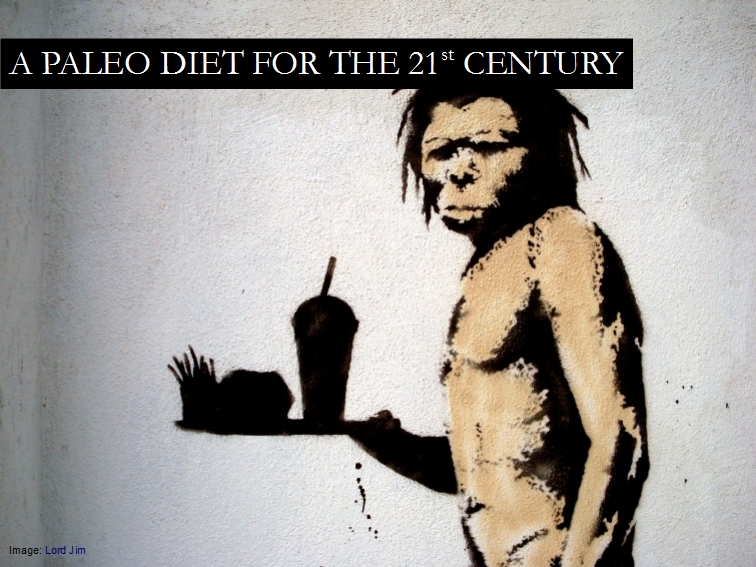How to Win an Argument With a Vegetarian

What better topic at a conference full of carnivores than how to deal with people who think you’re completely off base, if not criminally insane? And who better to give the talk than the young woman so versed in statistics that she wrote a convincingly scathing critique of the vegetarian Bible known as The China Study?
At the recent Ancestral Health Symposium at UCLA, blogger Denise Minger (pictured) was quick to defend the title of her talk, “How to Win an Argument With a Vegetarian” as not implying vegetarians are typically hostile.
“Usually they’re just gentle, peaceable people,” she said. She should know, she was one of them until recently. And a great many in the room also were ex-vegetarians, according to a show of hands. Now most of them gladly eat meat as part of the Paleo diet/lifestyle.
Minger said she decided on the topic when she found a plethora of web pages under the heading “How to win an argument with a meat-eater” but only a few advising meat-eaters on how to talk to a veggie (and one was perhaps not helpful as it suggested saying, “Shut up, you hippie!”).
But a little pro-protein PR may be needed, she said, as there’s been a recent barrage of vegetarian-friendly movies out – Forks Over Knives, A Delicate Balance, Vegucated, Voyage to Betterment – and a book, The Complete Idiot’s Guide to Plant-Based Nutrition.
These docs include interviews with members of a “plant-based diet doctor squad,” she said, including low-fat guru Dr. Dean Ornish – and The China Study author T. Colin Campbell.
Still, she was quick to point out that vegans and vegetarians are a health-conscious lot – just like paleo eaters tend to be, with their emphasis on well-sourced meats and avoidance of processed foods.
She said 75 percent of vegans abstain from alcohol, as opposed to 8 percent of omnivores; 94 percent abstain from smoking, as opposed to 67 percent of omnivores; and 80 percent of vegetarians exercise in their free time compared to 70 percent of omnivores.
So it was a message of inclusion, of the “we’re not so different, you and I” line that the villain always says to the good guy, who is loathe to believe it.
Well, inclusion up to a point.
Here’s where the talking points came in for winning that argument:
–Religious vegetarians, she said, who abstain from animal foods as part of their faith but perhaps do not have an overall healthy lifestyle, had a high risk of heart disease in a study of Taiwanese females.
–Animal protein is nearly always associated with greater bone density, not less, especially in the elderly, she said. (She added that Campbell’s association of animal protein with cancer may have been because he focused on casein, a milk protein. Other proteins may be different. “Whey is cancer protective,” she said.)
–There is no support for the “acid load and osteoporosis” theory, she said.
–Vegetarians and vegans often have lower bone mineral density (BMD) and higher fracture rates than omnivores, she said.
–Our guts are just not the same as herbivores’, she said, especially other primates: our colons shrank and we (mostly) lost the ability to get energy from fiber.
–Finally, she suggested asking vegans their opinion on bivalves (clams, oysters, etc., which have no central nervous system).
She recommended the site Let Them Eat Meat by a former veggie who looks at the ethical issues involved, as well as the British book Meat: A Benign Extravagance which she said explains that strawberries are more destructive to the environment than even factory-farmed meat.
Also mentioned was the book The Vegetarian Myth: Food, Justice, and Sustainability, by yet another former vegetarian. And don’t worry, The Complete Idiot’s Guide to the Paleo Diet comes out next year.
Things did get a little snippy during the Q&A with talk that vegetarians lack serotonin and B-12 which can lead them to be angry adversaries. But another presenter at the symposium, Robb Wolf, got up and said such discussion was “pissing away time.”
“If somebody doesn’t want to buy in, fuck ’em. Done,” he said in the jocular tone prevalent in his New York Times bestseller The Paleo Solution. “I just don’t see the benefit of a land-war on this.”
He suggested instead focusing on the people who want help, like the thousands who he said have flooded his inbox this year in hopes he’ll answer their queries in his podcast. He even advised that people try a vegan diet for 30 days, and then check various markers of health to see its benefits or drawbacks.
What? Try veganism? That may be one way to win the argument, but it may not be for everyone. “Salad is what food eats,” said an audience member.
–Guest post by Patrick Riley, AoE Culture Correspondent
A recent MFA graduate of USC’s School of Cinematic Arts, Patrick Riley has worked as a journalist, a screenwriter, and a TV editor. This year he is keeping his eye on developments in the movie industry as well as the culture of health and nutrition to share with AoE readers.
photo credit: Apneet Jolly
Other culture posts by Patrick Riley:
Where is Darwin on Dentistry? You Are What You Chew
Eat Like a Caveman? Field Notes from a Conference on the Paleo Diet
Mother Nature’s Sons: Beatles’ Progeny Struggle to Create Music Identity
HBO’s Game of Thrones: Marketing, Fan Culture, and Closure to a Beloved Fantasy Series





